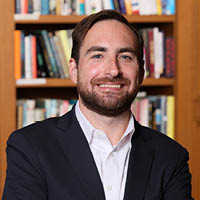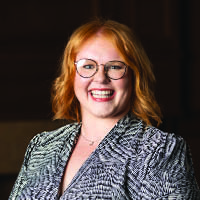Building Stronger Communities Through On-the-Ground Learning
The first Master of Public Service degree in the nation, the Clinton School’s MPS is an action-oriented program focused on preparing students for the tough work of on-the-ground change.
While learning valuable lessons in the classroom, MPS students complete three for-credit public service projects ranging from local work in Arkansas communities to international projects across the world.
The Clinton School is offering enhanced merit-based scholarships and cost-of-living stipends for Fall 2025 enrollment.
Enhanced Scholarship Opportunities
For the Fall 2025 enrollment cycle, the Clinton School is increasing the number of merit-based scholarship opportunities available to enrolling students. Enhanced cost-of-living stipends are also available.
The average scholarship-to-tuition ratio for the most recent enrolling cohort is 90%. Nearly half of the enrolling students received full-tuition scholarships.
After receiving scholarship and stipend support, students pay on average just $2,000 annually to earn their MPS degrees.
To learn more about institutional merit and need-based aid packages covering up to 100% of your tuition and fees, schedule a video chat with the admissions team.
Fall 2025 Application Deadlines
The Clinton School is currently accepting applications during our Supplemental Deadline period.
In this application window, we will consider new applications on a rolling basis until all spaces in the Fall 2025 cohort are filled.
Please note that due to lengthy timetable limitations relating to securing US Visas, the Supplemental Deadline is only available to domestic applicants, as well as international applicants currently living in the United States․
A Holistic Approach to Impact
The Master of Public Service program doesn’t elevate one academic discipline over another: We balance rigorous public policy and data analysis with effective communication and intensive relationship-building. Your studies and field experiences intentionally build on one another – a reflection of the program’s interdisciplinary design and small class sizes.
Our faculty of thought leaders and experts in community building are dedicated to your progress. Your classmates are all public service leaders – people who bring a remarkable variety of personal and professional experiences to every discussion.
With core courses in global development, field research, program planning, and program evaluation, the Clinton School curriculum has been developed to build stronger relationships, stronger communities, and a more workable and responsive world.
A Degree That Can Flex
We don’t subscribe to a narrow definition of public service. Our program is customizable and we’re able to offer personalized advising to help you chart your path. The second year of the program is particularly flexible: you can complete much of your coursework and your Capstone project from anywhere.
Our popular concurrent degree options in law, business, public health, and social work–each the first of their kind–add a dimension to your studies that give you a more versatile professional toolkit and equip you for a career in both the public sector and private sector.
Additionally, skill-building certificate programs in Social Entrepreneurship, Communication for Social Change, and Program Planning and Evaluation for Social Change were created with on-the-ground knowledge and feedback from Clinton School alumni and partner organizations.
Students have completed Capstone projects across the globe, including Cambodia, Peru, Romania, San Francisco, and New York. Many have worked with project partners in Washington, D.C., where there is a large and welcoming contingent of Clinton School alumni.
Lead Transformation for Anyone
The MPS prepares you to lead more responsive, resilient communities and organizations, whether they’re domestic or international, within a government agency, the nonprofit sector, or part of a major corporation. You’ll be known as a leader who learns from local wisdom and lived experience and valued as a builder of empathy and efficiency.
Our graduates have gone on to a wide range of careers, including director of refugee resettlement, NGO legal counsel, co-founder of a sustainability consultancy firm, documentary filmmaker, and a number of positions within policy and government agencies throughout the country.
The growth of social entrepreneurship and corporate social responsibility (CSR) has opened up more avenues for career possibilities: Clinton School graduates can be found in the corporate offices at Apple, Starbucks, Walmart, and other leading-edge companies.
Facilitate Dialogue Across the Divide
Change-makers and organizations have more data at their fingertips than ever before, but constructive dialogue on difficult topics remains the most effective tool for driving sustainable transformation. Effective dialogue facilitation is one of the signatures of the MPS. You’ll continually develop and implement these skills by moderating panels, leading town halls and community conversations, and presenting data to non-technical audiences.
Among the proven dialogue and communication techniques you’ll have the opportunity to study are liberating structures and positive deviance – experiential coursework that students say is life-changing—and communication leadership, which offers a special focus on developing leadership skills that inspire people to create solutions for complex challenges in their communities.
Your Network Begins the First Week
At the Clinton School, we teach and model the power of relationships. We believe relationships are key to becoming an effective leader and our intentionally tight-knit community is built on collaboration rather than competition. Our alumni consistently report that the relationships they form during their time in the program are among the most enduring and rewarding they’ve ever made.
Your network also grows thanks to the internationally prominent leaders, activists, and writers who speak at the Clinton Presidential Center throughout the year. Student opportunities for in-depth conversations with these visitors go far beyond the typical “meet and greet.”
What’s the Difference? Master of Public Service vs. Master of Public Administration
The Clinton School stands out from other public service and public affairs schools in two distinct ways: our broad range of available courses and our emphasis on fieldwork. Most Master of Public Administration programs focus on preparing students to work in local and state government or nonprofit organizations largely through lessons learned in the classroom, but lack the intentional, real-world experience that the Clinton School’s fieldwork provides.
Fieldwork at the Clinton School comprises a greater percentage of a student’s academic curriculum and creates more in-depth educational experiences. The International Public Service Project, which allows students to tap into the school’s expansive network of overseas partnerships, is a unique element of the program that few MPA programs offer.
Our Master of Public Service program can equip you with those real-world skills that a typical MPA program cannot. MPS students develop a public service mindset that serves them in every sector, public, private, and nonprofit, through a rigorous curriculum that integrates both classwork and field service. Graduates of the MPS program will leave with the soft skills that are in high demand – communication, teamwork, problem-solving, and leadership – and experiences that will help them become agents of change wherever they find themselves.
The MPS Admissions Process
Admission to the Master of Public Service degree program is determined by several factors including academic background, public service experience, and personal vision for future public service contributions. The Clinton School is test-optional and there is no application fee.
All applicants should meet the minimum criteria for graduate studies at the University of Arkansas, which includes a 2.85 undergraduate GPA. The Clinton School welcomes academically and experientially qualified applicants of all ideologies, backgrounds, ages, and life experiences.
Ready to Make a Change?
For more information on earning your master’s degree in public service, contact the Office of Admissions at admissions@clintonschool.uasys.edu or by calling (501) 682-3783.


